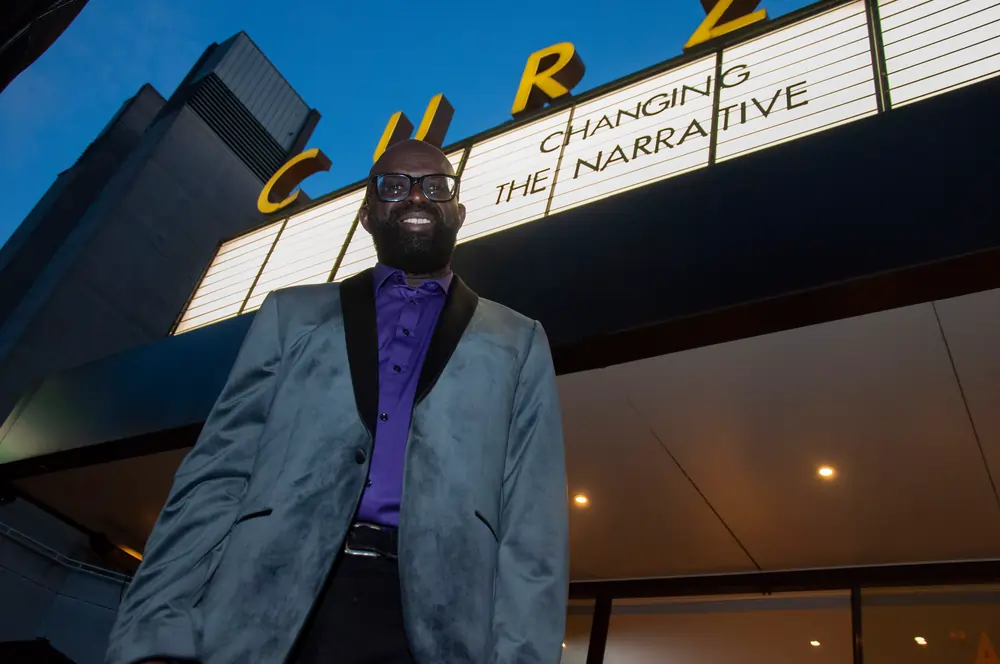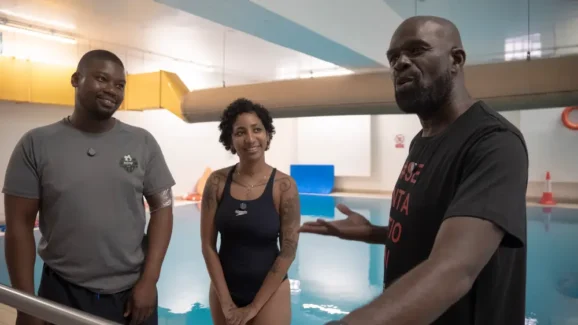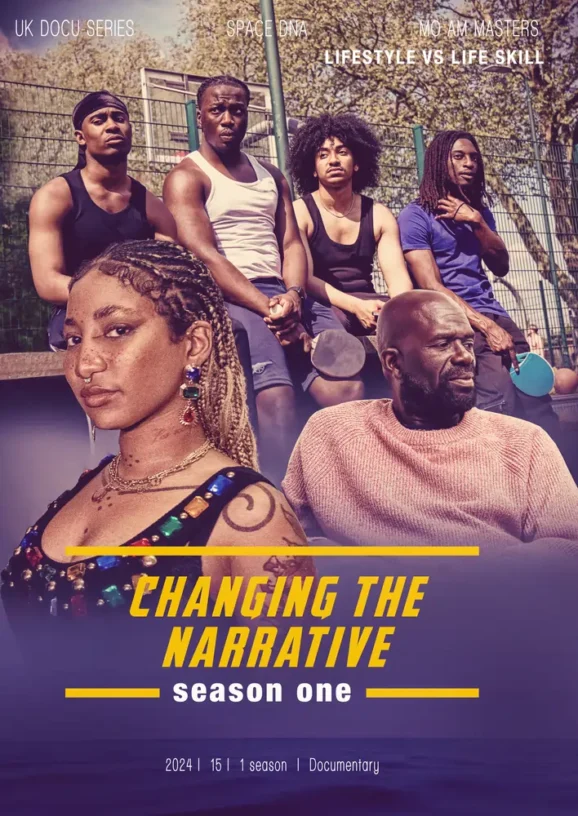The Aftermath of Changing the Narrative: Where do we go From Here?

John E. Kaye
- Published
- Home, Opinion & Analysis

As filmmaker Ed Accura’s latest documentary series, Changing the Narrative, concludes its impactful five-week run —having shined a spotlight on the “shameful reality” that 97% of Black adults and 96% of Asian adults in England do not swim or participate in other water-related activities—he poses a vital question: will stakeholders now step up to dismantle these barriers or let the status quo persist?
As we conclude the transformative five-week release of the documentary series “Changing the Narrative“, we stand at a pivotal crossroads.
Having unveiled the deeply personal barriers that have hindered youth participation in aquatics within African, Caribbean, and Asian communities, we must now demand bold action. It is no longer acceptable to passively acknowledge these disparities.
We challenge the aquatic sector, national governing bodies, the education system, media, corporate leaders, and community stakeholders: Will you take decisive steps to dismantle these barriers, or will you perpetuate the status quo?
The goal of this documentary was to ignite meaningful conversations with young people about the low participation rates in swimming activities within Black and Asian communities. We are pleased to see the impact this series has had, engaging the younger generation in unprecedented ways through powerful storytelling and open dialogue.
The documentary reveals the daily realities faced by these individuals, showcasing their personal experiences in various daily settings. At its core, it addresses the critical issue of limited aquatics participation by inviting honest discussions about their experiences and the broader social implications. Topics explored include mental health, physical health, aquatic career pathways, family challenges, dietary choices, religion, culture, and media representation—all supported by concerning statistics from the latest Active Lives data.
“Changing the Narrative” emphasises the importance of integrating swimming into youth culture and highlights the role of young people as future parents, leaders, and policymakers. It calls for a collective effort to dismantle the longstanding challenges surrounding aquatic participation. As the narrative unfolds, viewers are invited to engage in the vital conversation about breaking the cycle of low engagement in swimming across different ethnicities.
We have listened to the stories of struggle, anxiety around water, and the challenges faced. It is imperative that we do not let this opportunity for change go to waste.
Many have suggested that Black and Asian youths are hard to reach, making conversations about aquatics and other related subjects difficult. However, this documentary has proven that the communication barriers can be dismantled. The opportunity for dialogue has been opened.
So, I ask again: What will stakeholders do with the knowledge and insights gained from this documentary? Are we going to continue believing that we are doing everything possible to increase aquatic participation in these communities? Will we park this conversation and continue on the next Black History Month, or will we take meaningful action to create change?
The question remains: What will have changed in five years? Are we going to allow this moment to pass without meaningful action? Will we ever change the narrative and create a more inclusive aquatic environment for future generations?

Ed Accura is known internationally as the co-founder of the Black Swimming Association (BSA), a non-for-profit organisation that aims to increase diversity to the world of aquatics through research, education and advocacy, and as the acclaimed filmmaker behind groundbreaking documentaries including Blacks Can’t Swim, a three-part series released on Amazon Prime, SKY, Apple TV and Google Plus to encourage more people from African, Caribbean and Asian heritage in England to learn how to swim. His latest five-part docuseries, Changing the Narrative, premiered on September 29th 2024 and explores the limited participation of African, Caribbean, and Asian communities in aquatics. It has been released weekly throughout October to mark Black History Month.

RECENT ARTICLES
-
 The era of easy markets is ending — here are the risks investors can no longer ignore
The era of easy markets is ending — here are the risks investors can no longer ignore -
 Is testosterone the new performance hack for executives?
Is testosterone the new performance hack for executives? -
 Can we regulate reality? AI, sovereignty and the battle over what counts as real
Can we regulate reality? AI, sovereignty and the battle over what counts as real -
 NATO gears up for conflict as transatlantic strains grow
NATO gears up for conflict as transatlantic strains grow -
 Facial recognition is leaving the US border — and we should be concerned
Facial recognition is leaving the US border — and we should be concerned -
 Wheelchair design is stuck in the past — and disabled people are paying the price
Wheelchair design is stuck in the past — and disabled people are paying the price -
 Why Europe still needs America
Why Europe still needs America -
 Why Europe’s finance apps must start borrowing from each other’s playbooks
Why Europe’s finance apps must start borrowing from each other’s playbooks -
 Why universities must set clear rules for AI use before trust in academia erodes
Why universities must set clear rules for AI use before trust in academia erodes -
 The lucky leader: six lessons on why fortune favours some and fails others
The lucky leader: six lessons on why fortune favours some and fails others -
 Reckon AI has cracked thinking? Think again
Reckon AI has cracked thinking? Think again -
 The new 10 year National Cancer Plan: fewer measures, more heart?
The new 10 year National Cancer Plan: fewer measures, more heart? -
 The Reese Witherspoon effect: how celebrity book clubs are rewriting the rules of publishing
The Reese Witherspoon effect: how celebrity book clubs are rewriting the rules of publishing -
 The legality of tax planning in an age of moral outrage
The legality of tax planning in an age of moral outrage -
 The limits of good intentions in public policy
The limits of good intentions in public policy -
 Are favouritism and fear holding back Germany’s rearmament?
Are favouritism and fear holding back Germany’s rearmament? -
 What bestseller lists really tell us — and why they shouldn’t be the only measure of a book’s worth
What bestseller lists really tell us — and why they shouldn’t be the only measure of a book’s worth -
 Why mere survival is no longer enough for children with brain tumours
Why mere survival is no longer enough for children with brain tumours -
 What Germany’s Energiewende teaches Europe about power, risk and reality
What Germany’s Energiewende teaches Europe about power, risk and reality -
 What the Monroe Doctrine actually said — and why Trump is invoking it now
What the Monroe Doctrine actually said — and why Trump is invoking it now -
 Love with responsibility: rethinking supply chains this Valentine’s Day
Love with responsibility: rethinking supply chains this Valentine’s Day -
 Why the India–EU trade deal matters far beyond diplomacy
Why the India–EU trade deal matters far beyond diplomacy -
 Why the countryside is far safer than we think - and why apex predators belong in it
Why the countryside is far safer than we think - and why apex predators belong in it -
 What if he falls?
What if he falls? -
 Trump reminds Davos that talk still runs the world
Trump reminds Davos that talk still runs the world


























